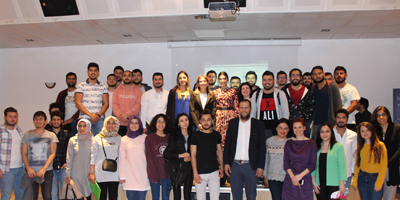“Developmental Problems in Early Childhood” approached at EUL
European University of Lefke (EUL) Vocational School of Health Sciences organized a conference themed “Developmental Problems in Early Childhood”. Dr. Ceren Tekgüç from Dr. Burhan Nalbantoğlu State Hospital Developmental Pediatrics Outpatient Clinic participated in the conference as a speaker.
Tekgüç described development as the progression of human cognitive, language (recipient language, expressive language), movement (fine movement, coarse movement), relationship, social – emotional areas from fertilization to death.
Toxic stress disrupts healthy brain structure
Tekgüç listed the types of stress that can be encountered in the early childhood period as positive stress, tolerable stress and toxic stress and stated that positive stress is mild and short (tantrums, vaccination, new onset), can be overcome with the help of a compassionate and sensitive adult, develops coping skills and it supports development. Tekgüç also said that tolerable stress stems from abnormal experience (death of the family member, severe illness, natural disasters, terrorist incidents), and the negative effects of this kind of stress can be reduced by the support of a compassionate and sensitive adult. She further stated that toxic stress disrupts healthy brain structure, causes physical and mental illnesses associated with chronic stress, as well as changes in the brain leading to learning and behavioral disorders.
Pointing out that experiences experienced in early childhood structure the brain in a way that does not change later, Tekgüç stated that inappropriate care or toxic stress experiences can lead to negative interactions with the brain in the early period.
Developmental problems should be diagnosed early
Emphasizing the frequency of developmental problems Tekgüç stated that this ratio is 15% and it observed in 1 of every 6 children. Pointing out that development problems in early childhood have lifelong effects Tekgüç stated that because of the rapid development of the brain in the first 3 years, the support given is more effective and profitable. Touching upon the frequent developmental problems, Tekgüç listed these problems as delay in speech, relationship, cognitive, movement, hearing / visual difficulties.
Tekgüç said that “As a child development specialist, you have access to children and families in early childhood. We have a great responsibility in the development of our children and the progress of society. Children’s development should be monitored, risks should be identified early and should be prevented, developmental problems should be diagnosed early, and when diagnosed, they should be directed to early support services”.

